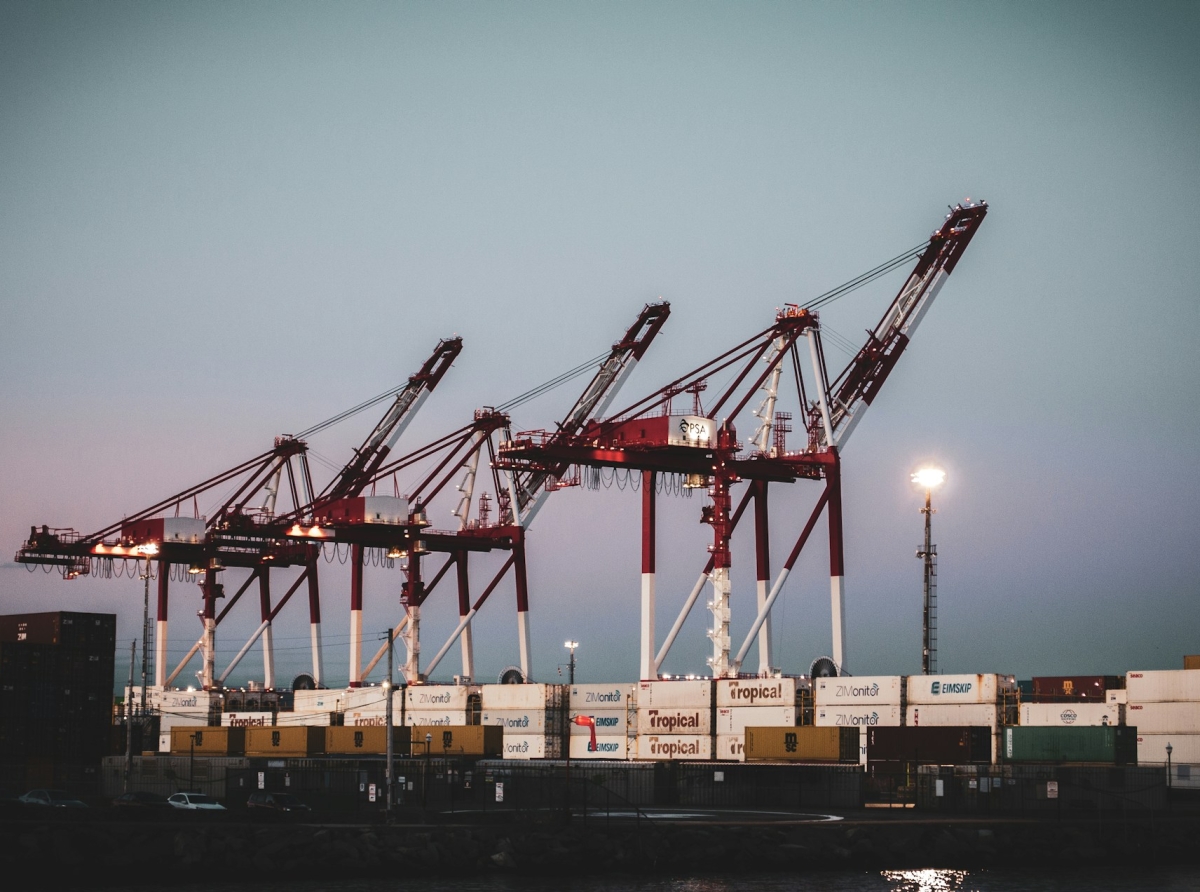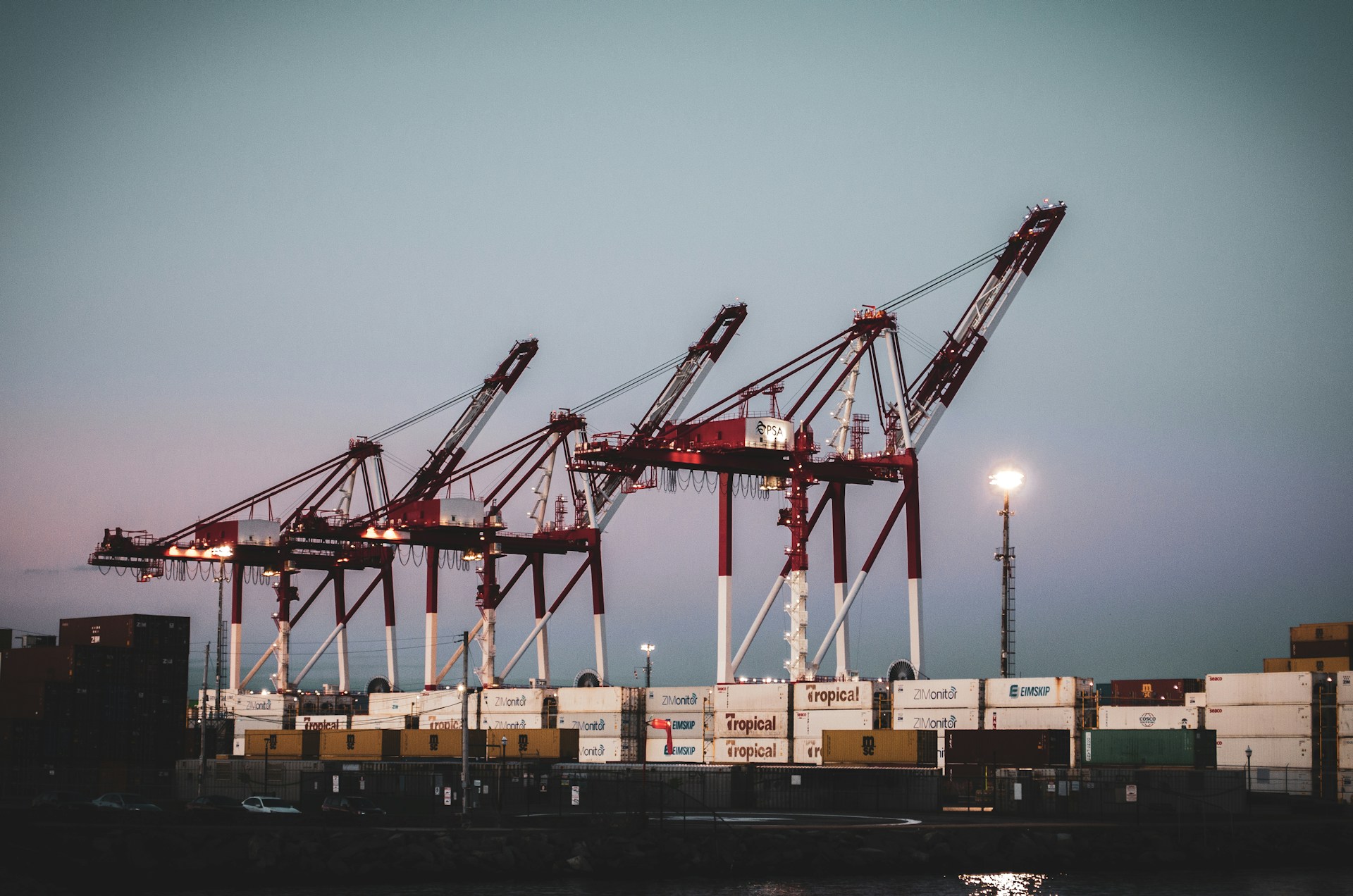Trump’s Tariffs Trigger Nationwide Export Decline in the U.S.

Trump’s Tariffs Trigger Nationwide Export Decline in the U.S.
The repercussions of President Trump’s tariffs are now rippling through the U.S. economy, causing a steep decline in exports that has spread to nearly every sector and port across the country.
What began as an export slowdown in early 2025 has escalated into a nationwide crisis, with agriculture bearing the brunt of the impact.
The situation highlights how trade policies can reshape global supply chains, disrupt markets, and create long-lasting economic challenges.
What began as an export slowdown in early 2025 has escalated into a nationwide crisis, with agriculture bearing the brunt of the impact.
The situation highlights how trade policies can reshape global supply chains, disrupt markets, and create long-lasting economic challenges.

Trump’s Tariffs Trigger Nationwide Export Decline in the U.S.
Data from supply chain analytics firm Vizion shows that U.S. exports have plummeted since January, affecting most ports and nearly all categories of goods.
Ports like Oregon and Tacoma have seen staggering declines, with exports dropping by 51% and 28%, respectively. These ports are critical for shipping agricultural staples such as soybeans, corn, and beef to markets in Japan, China, and South Korea.
The agricultural sector, already vulnerable to trade tensions, is now facing what industry leaders describe as an "unprecedented crisis."
Even larger ports like Houston and Seattle, which initially reported only minor declines (3–3.5%), are now signaling further deterioration.
“One thing is clear: almost all U.S. exports are affected,” said Ben Tracy, Vice President of Strategic Development at Vizion.
The root cause lies in the sharp drop in container shipments arriving in the U.S., driven by companies canceling orders from global partners, particularly China.
From April 21 to 28 alone, imports fell by 43% compared to the previous week.
Ports like Oregon and Tacoma have seen staggering declines, with exports dropping by 51% and 28%, respectively. These ports are critical for shipping agricultural staples such as soybeans, corn, and beef to markets in Japan, China, and South Korea.
The agricultural sector, already vulnerable to trade tensions, is now facing what industry leaders describe as an "unprecedented crisis."
Even larger ports like Houston and Seattle, which initially reported only minor declines (3–3.5%), are now signaling further deterioration.
“One thing is clear: almost all U.S. exports are affected,” said Ben Tracy, Vice President of Strategic Development at Vizion.
The root cause lies in the sharp drop in container shipments arriving in the U.S., driven by companies canceling orders from global partners, particularly China.
From April 21 to 28 alone, imports fell by 43% compared to the previous week.
“This is unlike anything we’ve seen since the disruptions of summer 2020,” said Kyle Henderson, CEO of Vizion.
Rising tariffs have doubled costs for small businesses, forcing them to suspend orders. Goods that once moved seamlessly through supply chains are now delayed or canceled entirely, creating bottlenecks across industries.
For example, manufacturers relying on imported components are struggling to maintain production schedules, while exporters face mounting backlogs due to reduced outbound shipments.
The agricultural sector is sounding the alarm, warning of a potential crisis. Farmers report they no longer have reliable access to international markets, leaving crops stranded and livestock unsold.
With fewer container ships arriving, there aren’t enough outbound vessels to transport American goods abroad.
This imbalance between inbound and outbound shipments has created a logistical nightmare for exporters, who are now forced to store unsold goods or sell them at a loss domestically.
Rising tariffs have doubled costs for small businesses, forcing them to suspend orders. Goods that once moved seamlessly through supply chains are now delayed or canceled entirely, creating bottlenecks across industries.
For example, manufacturers relying on imported components are struggling to maintain production schedules, while exporters face mounting backlogs due to reduced outbound shipments.
The agricultural sector is sounding the alarm, warning of a potential crisis. Farmers report they no longer have reliable access to international markets, leaving crops stranded and livestock unsold.
With fewer container ships arriving, there aren’t enough outbound vessels to transport American goods abroad.
This imbalance between inbound and outbound shipments has created a logistical nightmare for exporters, who are now forced to store unsold goods or sell them at a loss domestically.
“Tariffs are not just about raising prices—they’re about disrupting entire industries,” said Sarah Collins, an economist specializing in trade policy. “When you impose tariffs on imports, other countries retaliate by targeting U.S. exports. This creates a domino effect that impacts everything from agriculture to manufacturing.”
The ripple effects extend beyond individual sectors. Small businesses, which rely heavily on affordable imports and smooth supply chains, are among the hardest hit. Many have been forced to raise prices, reduce staff, or even shut down operations. Larger corporations are also feeling the strain, as they navigate higher costs and delays in receiving raw materials.
As trade policies reshape global demand, the ripple effects are undeniable. Companies are reassessing their supply chains, while U.S. exporters face mounting challenges in competing globally. Without intervention, the decline could deepen, leaving farmers and businesses struggling to survive in an increasingly volatile market.
Experts warn that the current situation could lead to long-term consequences for the U.S. economy. “If this trend continues, we risk losing our competitive edge in key global markets,” said Michael Reynolds, a trade analyst. “Other countries will step in to fill the gaps, and it may be difficult to regain lost ground.”
The ripple effects extend beyond individual sectors. Small businesses, which rely heavily on affordable imports and smooth supply chains, are among the hardest hit. Many have been forced to raise prices, reduce staff, or even shut down operations. Larger corporations are also feeling the strain, as they navigate higher costs and delays in receiving raw materials.
As trade policies reshape global demand, the ripple effects are undeniable. Companies are reassessing their supply chains, while U.S. exporters face mounting challenges in competing globally. Without intervention, the decline could deepen, leaving farmers and businesses struggling to survive in an increasingly volatile market.
Experts warn that the current situation could lead to long-term consequences for the U.S. economy. “If this trend continues, we risk losing our competitive edge in key global markets,” said Michael Reynolds, a trade analyst. “Other countries will step in to fill the gaps, and it may be difficult to regain lost ground.”
The Biden administration faces mounting pressure to address the fallout from these tariffs. While some argue that tariffs are necessary to protect domestic industries, others believe they are doing more harm than good. “We need a balanced approach that supports American workers without alienating our trading partners,” said David Kim, a policy advisor.
In the meantime, businesses and farmers are urging Congress to take action. “We’re running out of time,” said Tom Bennett, a soybean farmer from Iowa. “Every day that passes means more crops rotting in storage and more families struggling to make ends meet.”
In the meantime, businesses and farmers are urging Congress to take action. “We’re running out of time,” said Tom Bennett, a soybean farmer from Iowa. “Every day that passes means more crops rotting in storage and more families struggling to make ends meet.”









Report
My comments